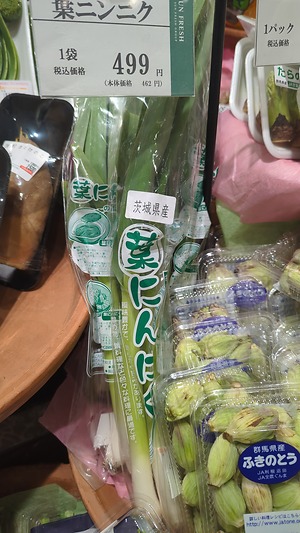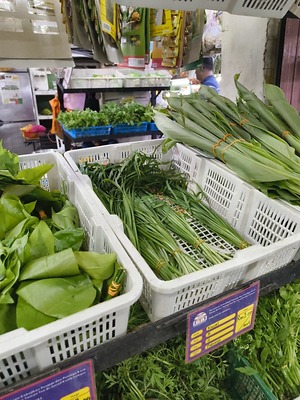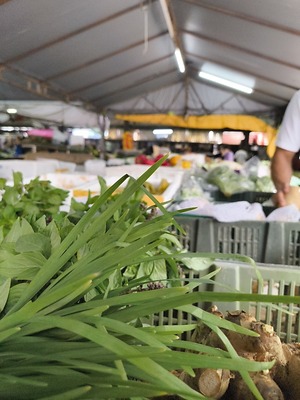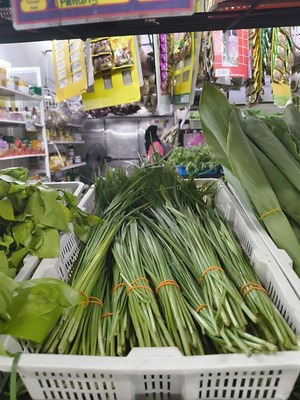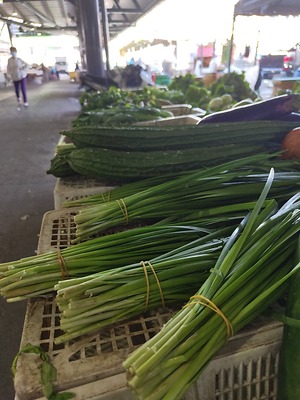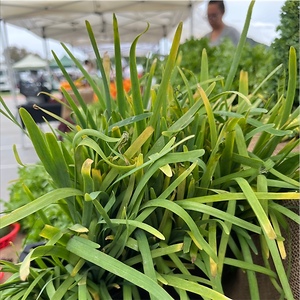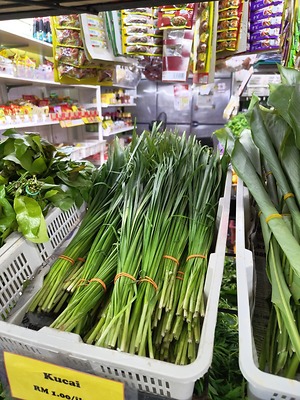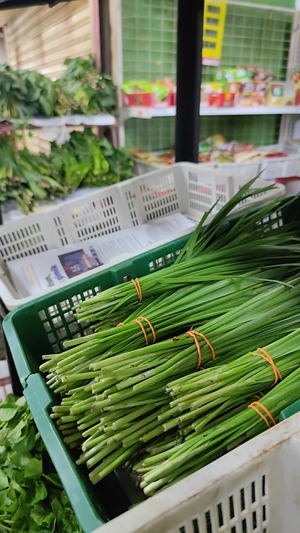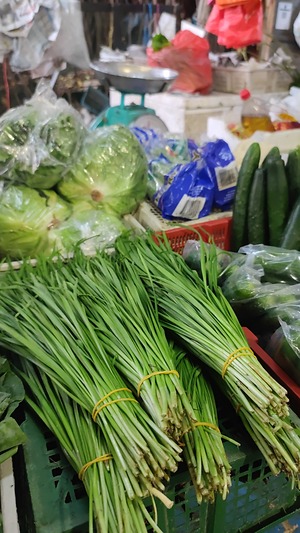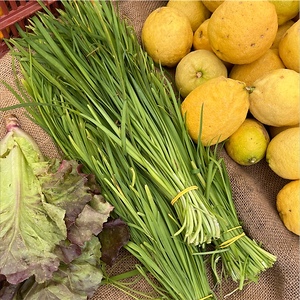

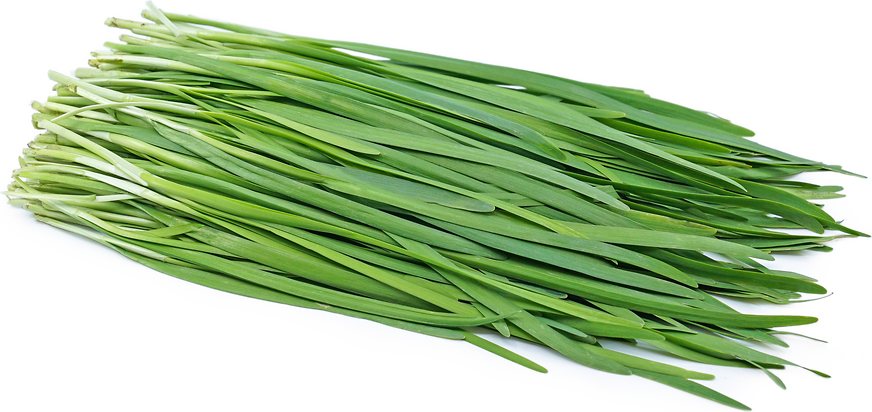
Garlic Chives
Estimated Inventory, lb : 25.00
This item was last sold on : 07/29/25
Description/Taste
Garlic chives have flat, wide green leaves that can grow up to about 15 to 38 centimeters long and measure approximately 5 to 8 centimeters wide. These leaves have a soft, ribbed texture that can feel delicate but is firm enough to hold their shape when cut. Each stem has a small, inedible white bulb at the base with white, edible, star-shaped flowers at the top. Garlic chives have a rich flavor that is often described as a mix of garlic and onion but is less pungent than a clove of garlic.
Seasons/Availability
Garlic chives are available year-round.
Current Facts
Garlic chives are botanically classified as Allium tuberosum and belong to the Amaryllidaceae family, which also includes onions, daffodils, and amaryllis. Garlic chives hold both ornamental and culinary value, as they are grown for their flowers and eaten for their edible stems. They are also known as Chinese chives, Oriental garlic, Asian chives, and Chinese leeks. Unlike garlic, which is prized for its bulbs, the bulbs of Garlic chives are inedible. There are several varieties of garlic chives, including Flowering, Yellow, and Standard, which are known as Gau Choy Fa, Gau Wong, and Gau Choy, respectively. Garlic chives are used in many of the same ways as standard chives, and both the leaves and the flowers are used as flavoring for many types of dishes.
Nutritional Value
Garlic chives are high in vitamin C, an antioxidant that strengthens the immune system, promotes collagen production for healthy skin, and supports wound healing. The presence of carotene enhances vision, boosts immune function, and helps maintain healthy skin. Garlic chives also provide vitamins B1 and B2, which are essential for energy metabolism, supporting nerve function, and maintaining healthy skin and eyes. Calcium in Garlic chives contributes to strong bones and teeth, while iron aids in oxygen transport through hemoglobin and helps prevent anemia. Although Garlic chives are commonly used as an ornamental plant in North America, they are edible and have long been utilized in Chinese herbal medicine for digestive health, fatigue relief, and wound healing.
Applications
Garlic chives can be used in both raw and cooked applications. They are a traditional element of pad Thai but are also included in other noodle dishes like udon, ramen, and pasta. They can also be used in stir-fry and tempura, green salads, stuffed into dumplings, chopped on top of bread rolls, and incorporated into egg dishes. Garlic chives are a popular topping for Donburi rice bowls and are often featured with ingredients like pork, tuna, minced beef, eggs, and tofu. Garlic chives can also be minced and used to finish meat, poultry, or seafood dishes and to flavor soups, marinades, vinegar, and dipping sauces. Garlic chives pair well with fresh herbs, soft cheeses, mushrooms, broccoli, spinach, kale, carrots, asparagus, bok choy, cabbage, scallions, bean sprouts, ginger, miso soup, sesame seeds, chili and oyster sauce, and cilantro. Garlic chives will keep for about three days when stored in a plastic bag in the refrigerator.
Ethnic/Cultural Info
Garlic chives were a favorite of artist Vincent van Gogh. He used them as the inspiration for a still-life painting created in Paris in 1887. In the oil painting, van Gogh skillfully rendered the vibrant, flat leaves of the chives with his signature heavy-handed brushstrokes. The dark, earthy green of the Garlic chives contrasts with the subtle tones of the wallpaper in the background, which likely reflected the interior design trends of the late 19th century. At the time, he was greatly influenced by Japanese woodblock prints and the concept of capturing beauty in everyday items and foods. The meticulous care with which he painted the plant's flat, ribbon-like leaves demonstrates his reverence for natural forms.
Geography/History
Garlic chives are native to southwestern China and have existed for over 4,000 years. They grow best in cool climates, require full sun exposure, and tolerate light frost. This variety may be found growing wild in meadows, grasslands, and along roadsides in some areas of China. Garlic chives began to spread from Central Asia to the Middle East on the Silk Road. They also made their way to Japan and Korea, where they were incorporated into their traditional cuisines. Garlic chives arrived in Europe during the 16th century and in North America in the 19th century. Outside of Central Asia, these chives can be found in home gardens, farmers' markets, and Asian markets in Europe and the United States.
Featured Restaurants
Restaurants currently purchasing this product as an ingredient for their menu.
| Fifty Two Remedies | San Diego San Diego | 858-707-7016 |
| Plant Based Meals | San Diego CA | 858-255-0590 |
| Secret Sister | San Diego CA | 619-281-0718 |
| Common Theory | San Diego CA | 858-384-7974 |
| Roppongi (IB) | Imperial Beach CA | 858-456-8018 |
| Artifact at Mingei | San Diego CA | 619-846-2164 |
| Bar Same Same (Kitchen) | Carlsbad CA | 760-470-9143 |
| Choi's | San Diego CA | 858-900-1224 |
| Azuki Sushi Lounge | San Diego CA | 619-238-4760 |
| Shimbashi Izakaya | Del Mar CA | 858-523-0479 |
| Lilo | Carlsbad CA | 619-385-0914 |
| Kingfisher | San Diego CA | 619-861-8074 |
| Convention Center Shell | San Diego CA | 619-954-3063 |
| Sheraton Carlsbad (Banquets) | Carlsbad CA | 760-827-2400 |
| Callie | San Diego CA | 619-947-9036 |
| Manna | Encinitas CA | 510-366-3057 |
| Animae | San Diego CA | 619-925-7908 |
| Trust Restaurant | San Diego CA | 609-780-7572 |
| Far Corner | San Diego CA | 619-549-0838 |
| Rosewood Social | San Juan Capistrano CA | 669-243-8403 |
Recipe Ideas
Recipes that include Garlic Chives. One
| She Simmers |
|
Stir-Fry of Flowering Garlic Chives and Pork |
| Weekend at the Cottage |
|
Bucatini with Lemon Garlic Chive Pesto |
| Just Bento |
|
Vegan Iri Dofu (iri doufu) with Garlic Chives |



